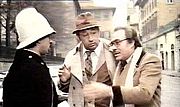- My Friends (film)
-
My Friends 
Directed by Mario Monicelli Written by Pietro Germi
Leonardo Benvenuti
Piero De Bernardi
Tullio PinelliStarring Ugo Tognazzi
Gastone Moschin
Philippe Noiret
Duilio Del Prete
Adolfo Celi
Bernard Blier
Milena Vukotic
Silvia DionisioMusic by Carlo Rustichelli Release date(s) 15 August 1975 Running time 140 minutes Country Italy Language Italian My Friends (Italian: Amici miei) is a 1975 Italian comedy-drama film directed by Mario Monicelli.[1]
The film, which made it to number one on the Italian box-office in front of Steven Spielberg's Jaws, was followed by two sequels, Amici miei Atto II (1982, also by Monicelli), Amici miei Atto III (1985), directed by Nanni Loy.
Contents
Plot
Like in many other Monicelli movies, the main theme of Amici miei is friendship, seen from a rather bitter point of view. It tells the story of four middle-aged friends in Florence who organize together idle pranks (called zingarate, "gypsy shenanigans") in a continuous attempt to prolong childhood during their adult life.
Count Mascetti (Ugo Tognazzi) is an impoverished noble who has no means to support his family, but does not renounce high living pleasures anyway, and has an underage mistress, Titti (Silvia Dionisio). Perozzi (Philippe Noiret) is an easy-living journalist harassed by the unceasing disapproval of his wife and his son. Melandri (Gastone Moschin) is a communal architect whose main goal is to find the ideal woman. Necchi (Duilio Del Prete) is the owner of a café and pool hall where the friends usually plan their zingarate.
During the movie they are joined by a renowned, military-like surgeon, Sassaroli (Adolfo Celi), in whose clinic they recover after being hospitalized, injured after a mismanaged zingarata. Melandri falls in love with Sassaroli's wife, exclaiming "I've seen the Madonna!", only to discover she has psychological problems.
The plot is mostly composed of elaborate practical jokes organized by the friends, including the creation of a fake mafia mob in whose "criminal acts" they involve a pensioner, Righi (Bernard Blier), who used to snatch croissants from the cake tray in Necchi's café, and Mascetti's attempts to save his marriage despite his relationship with Titti. The film ends with Perozzi's death, which still does not deprive the friends of their desecrating hijinks, not even in face of their own mortality; when Perozzi's wife, criticized by Melandri for her lack of tears, comments: "One can weep if somebody dies. But here nobody has died", Mascetti replies: "Well, in reality he had never been so much." During the funeral procession they "homage" their dead friend by telling the wide-eyed Righi that Perozzi was killed for being a traitor to the mafia.
Cast
- Ugo Tognazzi as Lello Mascetti
- Gastone Moschin as Rambaldo Melandri
- Philippe Noiret as Giorgio Perozzi
- Duilio Del Prete as Guido Necchi
- Olga Karlatos as Donatella Sassaroli
- Silvia Dionisio as Titti
- Franca Tamantini as Carmen
- Angela Goodwin as Nora Perozzi
- Milena Vukotic as Alice Mascetti
- Bernard Blier as Niccolò Righi
- Adolfo Celi as Professor Sassaroli
- Maurizio Scattorin as Perozzi's son
Other
- The project was begun by Pietro Germi, who could not continue it due to his death. Monicelli, who replaced him, moved the set from Bologna to Florence.
- In the original version Philippe Noiret is dubbed by Renzo Montagnani, who, in the sequels, replaced Del Prete as Necchi.
- One of the most popular scene is that in which the four friends, in order to raise Melandri's mood after his falling out with Sassaroli's ex-wife, organize a zingarata consisting in slapping people stretching out from the windows of a leaving train. One of the victims is Perozzi's son himself.
- The film was shot in Florence and its center was a real bar in Piazza Demidoff, along the River Arno, which then called itself "Bar Amici Miei" and featured posters of the film. In the Nineties it changed its name and was modernized becoming an American bar and losing all connections to the film.
References
External links
Films directed by Mario Monicelli 1930s I ragazzi della Via Paal • Pioggia d'estate1940s Totò cerca casa • Al diavolo la celebrità1950s Vita da cani • È arrivato il cavaliere! • Guardie e ladri • Totò e i re di Roma • Totò e le donne • Le infedeli • Proibito • Un eroe dei nostri tempi • Totò e Carolina • Donatella • Il medico e lo stregone • Padri e figli • I soliti ignoti • The Great War1960s Risate di gioia • Boccaccio '70 • I compagni • Alta infedeltà • Casanova 70 • Le fate • L'armata Brancaleone • The Girl with the Pistol • Capriccio all'italiana • Toh, è morta la nonna!1970s Brancaleone alle Crociate • Le coppie • La mortadella • Vogliamo i colonnelli • Romanzo popolare • Amici miei • Caro Michele • Signore e signori, buonanotte • Un borghese piccolo piccolo • Viva Italia! • Viaggio con Anita • Temporale Rosy1980s Camera d'albergo • Il Marchese del Grillo • Amici miei atto II • Bertoldo, Bertoldino e Cacasenno • Le due vite di Mattia Pascal • Speriamo che sia femmina • I picari • La moglie ingenua e il marito malato • 12 registi per 12 città1990s Il male oscuro • Rossini! Rossini! • Parenti serpenti • Cari fottutissimi amici • Facciamo paradiso • Esercizi di stile • Topi di appartamento • Panni sporchi • Un amico magico: il maestro Nino Rota2000s Come quando fuori piove • Un altro mondo è possibile • Lettere dalla Palestina • Firenze, il nostro domani • Le rose del desertoCategories:- 1975 films
- Italian films
- Italian-language films
- 1970s comedy films
- 1970s drama films
- Commedia all'italiana
- Films directed by Mario Monicelli
Wikimedia Foundation. 2010.

